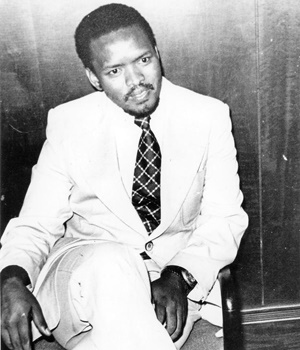
During the life of the late black consciousness movement leader Steve Biko, the law and police were used as instruments of oppression.
Biko said then: “In our country, there shall be no minority, there shall be no majority; there shall just be people. And those people will have the same status before the law.” This was an ideal for which he died.
Since 1994, South Africa has created a very different environment from the one in which Biko lived and has laws which, on paper, are laudable.
Despite this progress, contemporary South Africa still suffers from the vestiges of apartheid, as evidenced by economic imbalances, disparities in education and police brutality.
A few weeks ago, the nation marked the third anniversary of the massacre of mine workers in Marikana by police. When Marikana occurred, an acquaintance who was active in the United Democratic Front recalled the terror he had experienced when facing apartheid-era police in riot gear and being surrounded by tear gas. He expressed his disbelief that a similar scenario was playing out in the post-apartheid era – this time, with a largely black police force.
Besides acknowledging the tragedy of Marikana – and the conditions that made it possible – there should be an understanding that police, who are charged with protecting citizens, die daily in carrying out their duties. There should be a respect for their lives and for the work that they do.
Biko’s death in prison on September 12 1977 at the hands of police was a reality. The official causes of death in police detentions then ranged from slipping on a bar of soap, to suicide by hanging or jumping and, in Biko’s case, a hunger strike.
South Africa also lost the leadership of Mapetla Mohapi, Ahmed Timol, Neil Aggett and many others through police brutality.
In each of these deaths, justice was far from served, with no one being held to account in the 1970s and 1980s or during the Truth and Reconciliation Commission. At Biko’s inquest, the magistrate famously declared there was “no one to blame”.
Nthato Motlana, a Soweto activist who was barred by police from travelling by road to King William’s Town, said at Biko’s funeral that he had watched as black policemen had hauled mourners off buses in Soweto and assaulted them with truncheons.
Fast-forward four decades later and we have seen images of police dragging taxi driver Mido Macia behind a police van. Ten police officers have been charged with the death of Khuthazile Mbendu in police custody in December last year. It is alleged that he was beaten en route to the police station and tortured through electrocution. He later died in hospital.
While some of these perpetrators have been held accountable for their crimes – which are egregious in light of their uniforms – denoting progress, the reality is that deaths resulting from police brutality should not be such a common occurrence 38 years after Biko’s killing.
With that said, the fact that South Africa has buried more than 50 police officers killed in the line of duty this year is equally egregious.
The question is, how do we build a society in which the respect for life is observed and in which we collectively pursue the vision that Biko articulated?
This is not only a question plaguing South Africa, but one which is foremost on the minds of people elsewhere – most notably the US, where the Black Lives Matter movement is vociferously protesting against the fact that more than 400 black people are annually killed by police.
My view is that while we can, and should, legislate human rights, we need to go beyond the letter of the law and build an environment in which people also pursue the spirit of the law.
As we commemorate the murder of Biko during the month of September, his work and that of his colleagues in the black consciousness movement serves as a powerful example of how we can change hearts and minds. Their work, in particular the black community programmes, inspires our approach at the Steve Biko Foundation.
It is an approach in which we focus on what I call “the three C’s”. The first is consciousness: Who am I? The second, community: What is my place in the world? The third is core skills: empowering individuals with the tools to make their dreams a reality.
Biko’s death, of which he prophetically spoke when he said, “And your method of death can itself be a politicising thing,” forces us to interrogate the ways in which we see one another, and the extent to which we realise our joint humanity.
Through his life and death, Biko taught us that the battle to end police brutality will not be won only through the courts or oversight bodies – although these are key – but that victory will begin with a transformation of our hearts and minds.
In this way, South Africa will realise Biko’s assertion that “in the long run, the special contribution to the world by Africa will be in this field of human relationships. The great powers of the world may have done wonders in giving the world an industrial and military look, but the great gift still has to come from Africa – giving the world a more human face.”
Amponsah is CEO of the Steve Biko Foundation




 Publications
Publications
 Partners
Partners








